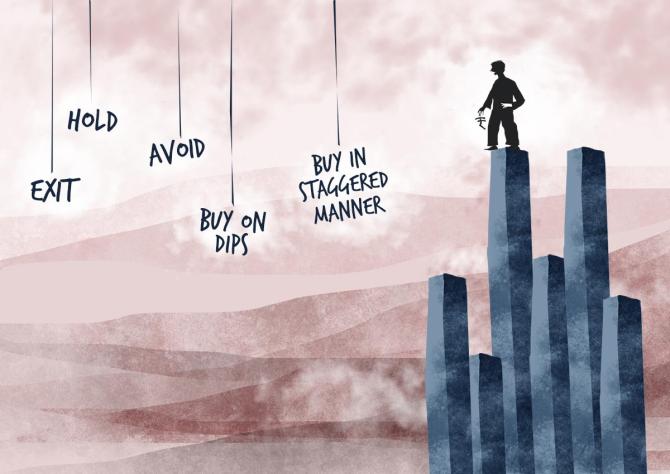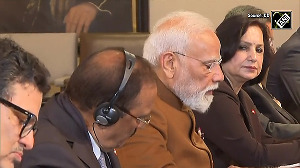'Indices will remain range bound in 2022 as earnings catch up with the current multiples.'

It has mostly been a one-way street for the Indian equity markets in 2021.
Ajay Garg, managing director at Equirus, tells Puneet Wadhwa/Business Standard that he expects a lot of action in the debt segment over the next few years given how the interest rates play out.
What's your market outlook for 2022?
It is difficult to predict the market in a shorter time frame, though it would not surprise us to see indices remain range bound in 2022 as earnings catch up with the current multiples.
The few sectors which didn't move like capital goods and real estate will see an uptick.
One play these sectors in multiple ways, including the direct players or the indirect beneficiaries.
Has the Paytm listing shaken the confidence of retail investors in the primary and the secondary markets?
We have seen a great level of discerning behaviour.
As such, a large part of the market really did not participate.
Yes, large issues like Paytm not doing well do shake investor confidence, but I completely agree with the statement by their founder that everything is part of a journey which will continue.
Are the private equity and venture capital funds you talk to still enthusiastic about the primary markets?
Besides Paytm, there were three other issues that were well received with good post listing performance.
Since the secondary market continues to do well, we have not seen any one deferring their plans in a big way yet.
That said, this has been one of the best years for PE/VC exits.
They continue to be enthusiastic about their portfolios and are also looking at fresh deployment.
Do you see companies tap alternate routes for investment other than the primary markets now?
Besides good primary markets, corporates are also seeing the benefit of benign interest rates.
They are actively looking at the bond and corporate debt programme, a division which we had put in place at the right time.
A lot of action is likely in the debt segment over the next few years in the backdrop of how the interest rates play out.
How do you see India Inc negotiate the possibility of rising interest rates and firm commodity prices?
Inflation has become a point of concern globally.
Most central banks are grappling with the thought of how transitory the inflation is, how long it will last and therefore is it a case of rate action or not.
The inflationary factors are predominantly oil and commodity prices, which have been a fallout of global supply chain disruptions caused by the pandemic.
With the pandemic risk still lurking around the fringes, global growth is yet to attain a structural foothold.
India is no way different from the rest of the world.
Producers are increasingly looking to pass on their margin pressures.
Are the markets prepared for a rate hike?
While a direct rate hike may be some time away, normalisation of liquidity and narrowing the reverse repo-repo corridor should be underway in the upcoming policies.
In the wake of rate hike by global central banks, the rupee may see some pressure.
However, India has over $640 billion in reserves and India Inc's balance sheet position is stronger than earlier.
Asset quality issues are largely behind us and the banking system, too, has adequate liquidity.
Indian markets are in a position of strength and the fiscal situation is also stable.
It is likely to remain so in case rates were to rise.
Margin pressures will persist in the short term and as growth recovers producers will continue to pass on their input costs.
Margin pressures for producers should ease over the next one year with growth recovery, but the consumer side inflation will be watched for.
RBI will then eventually have to act.
Feature Presentation: Aslam Hunani/Rediff.com











